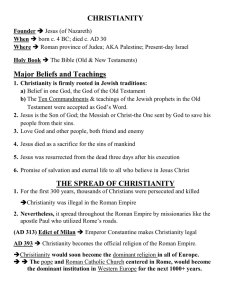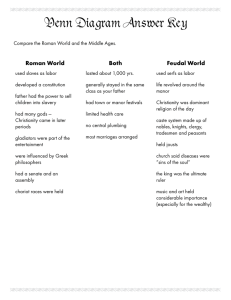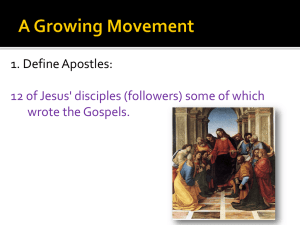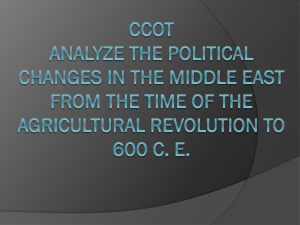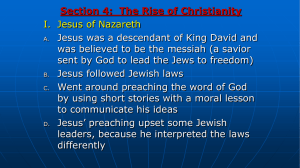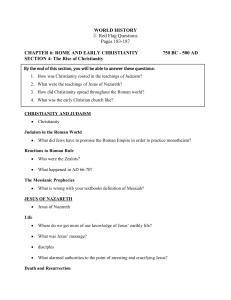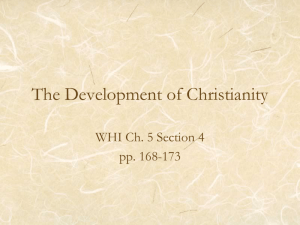Gnostic Christianity
advertisement
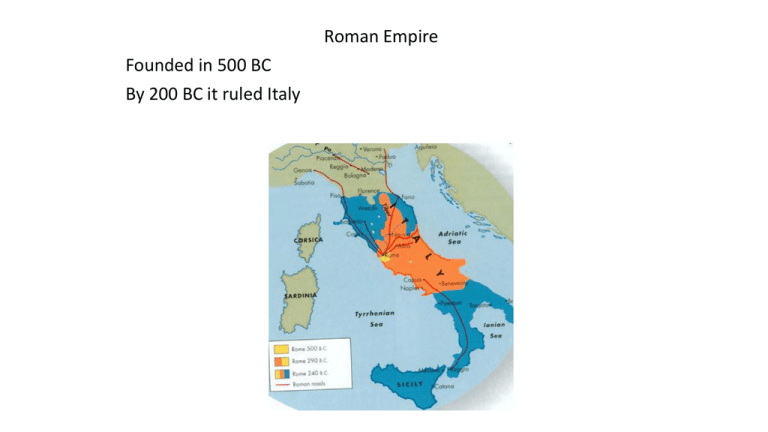
Roman Empire Founded in 500 BC By 200 BC it ruled Italy 60 BC 180 AD Growth from 44 BC to 180AD 146 BC Battle of Corinth Roman Troops concur the city of Corinth. Rome invented no art forms, constructed no original system of philosophy, and made no scientific discoveries. They made good roads, systematic legal codes and efficient armies; for the rest they looked to Greece. ~ Bertrand Russell (History of Western Philosophy) Greek and Roman Gods Rise of Christianity Christianity began in 1st century AD Jerusalem as a minor Jewish sect. It spread initially in the Near East, ultimately becoming the state religion of Armenia in either 301 or 314, of Ethiopia in 325, of Georgia in 337, and then the state religion of the Roman Empire in 380. During the Age of Exploration (15th to 17th cent.), Christianity expanded throughout the world, becoming the world's largest religion. Between 1st and 4th century – Growth of Christianity Pagan Philosophers were replaced by Patrists (Fathers of the Church) 3rd Century –Battle of Milvian Bridge Agreement of Milan As Rome Grew, so did Christianity Many Pagan symbols were incorporated into Christian holiday traditions. Video Celsus Celsus's work was an attack on Christianity and an appeal to Christians to adopt paganism. Arguments: - Mary is too low born to be mother of a Christ. - Jesus had a human father who Celsus claimed was “Pantara” a Roman soldier St. Justin Martyr Born a Pagan in Jerusalem. Tried on lots of philosophical ideas (e.g., stoic) Finds Platonism and converts to Christianity. Tries to reconcile Plato and Christianity. Argues that the Socrates and Plato preaching the “seeds” of Christianity. “All Truth is God”. Plotinus – 205 – 270 Neo-Platonism Combined Plato with ethical concepts from Christianity, Judaism and Near Eastern Mysticism Like Plato – Idealist To get closest to the One, each individual must engage in divine work. Each individual as a microcosm reflects the gradual ordering of the universe referred to as the macrocosm. In mimicking the divine mind, one unites with it. Thus the process of unification, of "The Being", and "The One", making each man a God by replacing the concept of God as creator with themselves as creators, builders, craftsmen of their own lives. Augustine of Hippo (345 – 430) •one of the most important figures in the development of Western Christianity •Strongly influenced by Neo-Platonism. Dualist - humans have souls – animals do not. Free Will (Choice) Intrinsic motivation Doing good leads to feelings of virtue Doing evil leads to guilt. People who choose evil deny themselves an afterlife Augustine developed the concept of the Church as a spiritual City of God distinct from the material City of Man. “Give me chastity and continency, but not yet” Orthodoxy & Heresy 1st & 2nd Century – no authority = no Heresy 3rd Century – Bishop of Lyons Refutation of Heresies - maintained that the Gospel message is for everyone. He was perhaps the first to speak of the Church as "Catholic" (universal). - Gnostic Christians and Pauline Christianity Pauline Christianity placed all of the emphasis on Jesus' death and resurrection, and the saving power of that death and resurrection. Gnostic Christianity, on the other hand, placed its prime emphasis on the message, the wisdom, the knowledge, the gnosis, that's where the word gnostic comes from, the Greek word for knowledge, the knowledge that Jesus transmits, and even the secret knowledge that Jesus transmits. Gnostics were dualists, teaching that there are two great opposing forces: good versus evil light versus darkness knowledge versus ignorance spirit versus matter. Since the world is material, and leaves much room for improvement, they denied that God had made it. How can the perfect produce the imperfect, the infinite produce the finite, the spiritual produce the material? Gnostic’s solution was to say that there were thirty beings called Aeons, and that God had made the first Aeon, which made the second Aeon, which made the third, and so on to the thirtieth Aeon, which made the world. They taught that Christ did not really have a material body, but only seemed to have one. It was an appearance, so that he could communicate with men, but was not really there. They said that Jesus had had two doctrines: one a doctrine fit for the common man, and preached to everyone, and the other an advanced teaching, kept secret from the multitudes, fit only for the chosen few, the spiritually elite. The Gnostics, were the spiritually elite, and although the doctrines taught in the churches were not exactly wrong, and were in fact as close to the truth as the common man could hope to come, it was to the Gnostics that one must turn for the real truth. Heresy of Docetism Jesus has no real body. Crucifixion was an illusion. Jesus is God who cannot suffer. Constantine backs the authority of the bishop (Paulian) and confiscates the public property of heretics. Persecuted become persecutors! Concepts of original sin and just war Unbelievers persecuted because of cruelty; Christians persecuted because of love. Science and Philosophy not in the service of theology were suspect. AD 385 – executions for heresy begin. Priscillian (Bishop of Villa) Held Gnostic beliefs Charges with witchcraft. Tried and Tortured; confessed and was executed. Schisms in the Church Montanus Heresy 475 Fall of Rome 475 – 1000 Dark ages Middle Ages (500 – 1500) • Crusades began around 1100 ad • Plague • Famine • Writings were lost to western culture • Schisims in the Church Saint Anselm (1033 -1109) Contrary to Christian belief he felt that reason Could help better understand God. Scholasticism – to join faith with reason Defined theology as "faith seeking understanding." Use logical deduction to account for traditional theological teachings. Ontological Argument for God’s existence If God did not exist, then something greater than He could be thought; thus, God must exist. Saint Thomas Aquinas (1225 -1274) Argued Reason and Faith are compatible Reintroduced Aristotle theology Tabla Rasa Empiricist Argued for the supremacy of reason – free will. John Duns Scotus (1265 – 1308) Criticized both Aquinas and Aristotle Argued for the Supremacy of God’s will If God’s will is subordinate to reason then it appears that God is limited, which can not be. Thus God must be absolutely free. God’s moral rules are good because God willed them to be good, not because His wisdom recognized them to be. Thus one cannot understand morality from a rational standpoint. Dunsmen, Duncemen --- Dunces. William of Ockham 1287–1347 Ockham’s Razor - the principle that when trying to choose between multiple competing theories the simplest theory is probably the best. (K.I.S.S!) Nominalist – Universals (truths) exist in name only. Charged with heresy & excommunicated. Late Middle Ages – Famine, Plague, War, Peasant Revolutions When you hit Bottom, there is no where to go but up!!! The first European medieval institutions generally considered to be universities were established in Italy, France, and England in the late 11th and the 12th. Representation of a university class, (1350s).
